

ALSO BY THE AUTHOR
F ICTION
Good Riddance
Run for Your Life
N ONFICTION
A Year of Writing Dangerously
Writing Out the Storm
Courage & Craft
Cherished: 21 Writers on Animals They Have Loved & Lost
(Editor)
P OETRY
Traveling without a Camera
(with Norma Almquist and Jeanne Nichols)
B OOKS FOR Y OUNG P EOPLE
The Other Side of a Poem
Amanda & Heather & Company
Cat-Mans Daughter
Michael and the Cats
Charlie Anderson
Bad Dog, Dodger!
The Show-and-Tell Lion

Copyright 2013 by Barbara Abercrombie
All rights reserved. This book may not be reproduced in whole or in part, stored in a retrieval system, or transmitted in any form or by any means electronic, mechanical, or other without written permission from the publisher, except by a reviewer, who may quote brief passages in a review.
Text design by Tona Pearce-Myers
Library of Congress Cataloging-in-Publication Data
Abercrombie, Barbara.
Kicking in the wall : a year of writing exercises, prompts, and quotes to help you break through your blocks and reach your writing goals / Barbara Abercrombie.
pages cm
Includes bibliographical references.
ISBN 978-1-60868-156-3 (pbk. : alk. paper) ISBN 978-1-60868-157-0 (ebook)
1. FictionAuthorship. 2. Creative writing. I. Title.
PN3355.A25 2013
808.3dc23 2013004763
First printing, May 2013
ISBN 978-1-60868-156-3
Printed in Canada on 100% postconsumer-waste recycled paper
 New World Library is proud to be a Gold Certified Environmentally Responsible Publisher. Publisher certification awarded by Green Press Initiative. www.greenpressinitiative.org
New World Library is proud to be a Gold Certified Environmentally Responsible Publisher. Publisher certification awarded by Green Press Initiative. www.greenpressinitiative.org
10 9 8 7 6 5 4 3 2 1
For my students
I would go as far as I could and hit a wall, my own imagined limitations. And then I met a fellow who gave me his secret, and it was pretty simple. When you hit a wall, just kick it in.
P ATTI S MITH
CONTENTS
T his is a book of exercises warm-ups and side doors into stories, ways to kick down the walls and surprise yourself with where your writing can go. The best way to approach the exercises is to give yourself a five-minute time limit for each writing prompt. If you get on a roll, you can always keep writing, of course. And if you dont, so what? Youve only spent five minutes on it. You can tear it up; its just an exercise.
In my writing classes and workshops, we do a lot of five-minute exercises. The only rule is that you have to keep your pen moving for the whole five minutes, no stopping to correct what youve written or to think about what to write. When you do this, you get out of your own way; you let the process of writing take over. Amazing things can happen; Ive seen novels, memoirs, and many essays get started with the five-minute exercises. And a lot ended up being published.
Oddly, directions and boundaries (seemingly the antithesis of creativity) can help you get into your stories. No writer has the time to wait around for inspiration, but inspiration has a way of arriving when youre already writing.
A years worth of exercises follows, 365 one-line prompts and longer exercises to get you going. There are quotes to inspire you, and in the second part of the book are examples of what my students came up with for some of the exercises. (You may want to wait until after you try the exercises yourself to read them.)
If youre writing fiction, give the you in the prompts to one of your characters, and see what he or she has to say. New glimpses of your characters, unexpected details, sudden ideas, can expand your fiction. Let your characters surprise you when you use them for the exercises; see where your story can go when you loosen up.
Whenever you veer off into another topic in an exercise, just follow your own instincts and keep going. Do them alone, or with a writing buddy, or in a group. Do one a day, five once a week, or ten over a weekend. Write them in your journal or in a special notebook, or start a new file on your computer. Whatever works best for you. Youre not taking a test; youre just exercising.

Writers block is not a problem for me, ever. It comes from being diverted... by outside considerations, such as self-censoring, fear, and accepting the dictates of others.... The cure is to do exercises.
K ATE B RAVERMAN
1.Jot down the details of your wall or whatever stands between you and the page. Close your eyes and envision it. Maybe its a real wall you see gray, thick, and impenetrable. Or maybe its a voice you hear a teacher or parent, or possibly your own voice. Imagine a concrete image or sound, then note whatever details or pictures float into your head. Is the wall thick? Flimsy? Covered with ice? If you hear negative voices, what are the words? If you have a kitchen timer, you might set it for five minutes, or just check your watch or a clock. Take a deep breath and dont think go for five minutes.
2.Write an intention, a new way to look at the block or wall thats keeping you from writing, or a plan to ignore it and move on. Maybe you have a description of a formidable wall, or a negative monologue, or maybe just random words scattered on the page. It doesnt matter, as long as you write something, anything, for five minutes. Could your wall also be giving you privacy and protection? Or maybe you need to blast a hole in it or dynamite it to smithereens. Its your wall; you get to decide how to handle it.
The hardest part is the first three sentences. Sitting down with pen and paper and just getting those first three sentences out; I sometimes have to write my way into something knowing that the first paragraph is just preliminary, but I have to write myself in. Its like being in a cold lake and sometimes you have to go in toe by toe. Some of you can plunge in, but not always; you have to write your way into it. And then youre swimming.
M ADELEINE L ENGLE
3.Write three sentences. They dont have to connect. They dont even have to make sense. Just three sentences.
4.Write about a time you went into cold water a lake, pool, shower, or rain. Write about how your body reacted. Was it delicious relief from the heat, or a shock that caused goose bumps and made your lips turn blue? Or write about the cold water as a metaphor.
Im trying to cause people to be interested in the particulars of their lives because I think that theres one thing literature can do for us. It can say to us: pay attention. Pay closer attention.
Next page
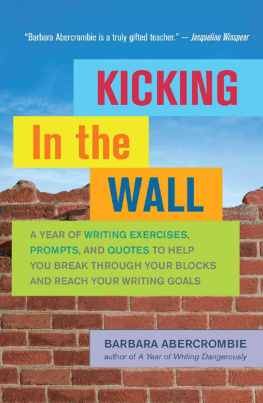

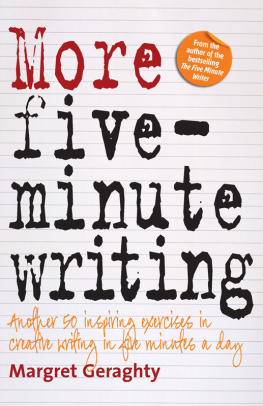
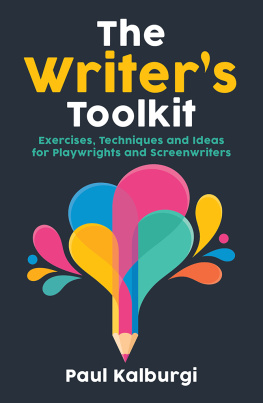
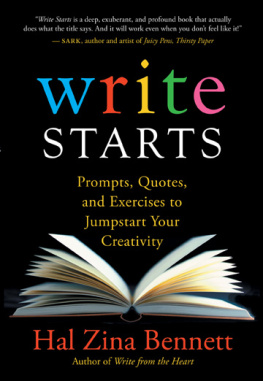
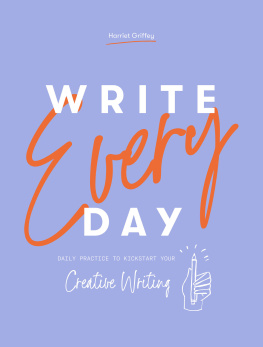
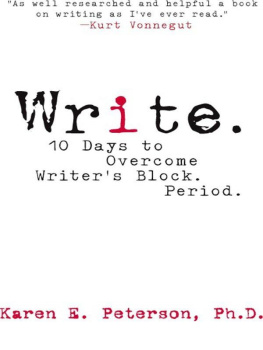

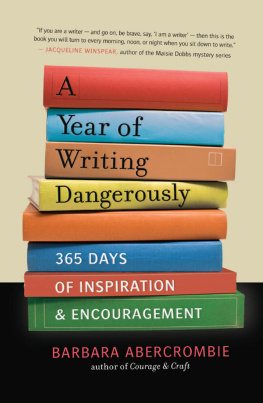
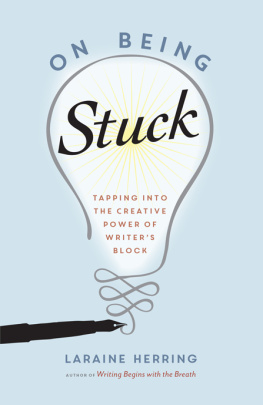




 New World Library is proud to be a Gold Certified Environmentally Responsible Publisher. Publisher certification awarded by Green Press Initiative. www.greenpressinitiative.org
New World Library is proud to be a Gold Certified Environmentally Responsible Publisher. Publisher certification awarded by Green Press Initiative. www.greenpressinitiative.org